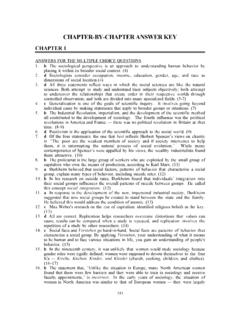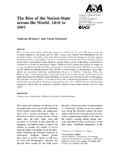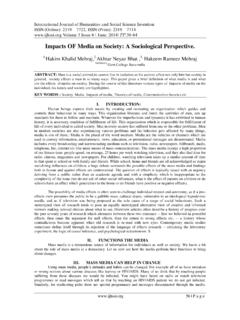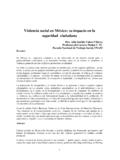Transcription of www.jtpcrim.org
1 Journal of Theoretical and Philosophical Criminology For sociological Reason January, 2015, Vol. 7(1): 73-82 Carrier & Walby _____. January, 2015, 7, 73-82. _____. For sociological Reason: Crime, Criminalization, and the Poverty of Biosocial Criminology Nicolas Carrier, Carleton University &. Kevin Walby, University of Winnipeg _____. The publication of our article Ptolemizing Lombroso: The Pseudo-Revolution of Biosocial Criminology'. (Carrier and Walby, 2014) in the Journal of Theoretical and Philosophical Criminology has prompted a response penned by Anthony Walsh and John Paul Wright, arguably two of the most active proselytizers of biosocial criminology in the United States.
2 Walsh and Wright are indeed important figures in contemporary struggles to stimulate and legitimize cross-fertilization between American criminology and human biology. As we have documented in Ptolemizing Lombroso,' Walsh, Wright and many other proponents of biosocial criminology see this approach as a necessary scientific revolution in criminology, and they bemoan a widespread ideological allegiance to sociology (Beaver, 2008, ) within criminology that would impede a full-blown biosocial revolution in this field of study.
3 Having taken notice of such revolutionary discourses in our previous engagements with biosocial criminology (Carrier and Walby, 2011; Walby and Carrier, 2010), we decided to rigorously analyze how biosocial criminologists establish the need to revolutionize criminology, and how biosocial criminology is represented as the only path for the rise of criminology to a post-ideological existence. We demonstrated that biosocial criminology espouses a narrow Lombrosian conception of criminology, and we borrowed i ek's (1999) notion of Ptolemization to describe the minor and pseudo-revolutionary modifications that biosocial criminology operates on it.
4 We did not equate contemporary biosocial criminology with 19th century criminal anthropology. Walsh and Wright (2015, ) noted that our analysis, in contrast to many other critics, is informed by, not ignorant of, academic biosocial literature. Having established the pseudo-revolutionary nature of biosocial criminology, Ptolemizing Lombroso'. proposed an epistemologically-focused critique, turning biosocial criminologists' attacks on ideology against themselves. We suggested that the failure of biosocial criminology to establish itself as a reigning criminological paradigm has nothing to do with the ideological stubbornness of social scientists, and is rather symptomatic of the poverty and antisociality of biosocial criminology.
5 In their response to Ptolemizing Lombroso,' Walsh and Wright celebrate a vision of scientific progress grounded on the possibility of scholarly scrutiny and debates. Yet, as we establish here, they fail to engage with the limitations and aporias of biosocial criminology that we identified, deciding instead to characterize our 73. Journal of Theoretical and Philosophical Criminology For sociological Reason January, 2015, Vol. 7(1): 73-82 Carrier & Walby scholarly contribution as a mere ideological lampoon. Given their declared respect for scholarly debates, and given that parts of Ptolemizing Lombroso' actually documented how biosocial criminologists translate scholarly critiques into ideological manifestos; we are astonished to see Walsh and Wright using such a stratagem once again.
6 In Rage Against Reason: Addressing Critical Critics [sic] of Biosocial Research' (Walsh and Wright, 2015), we are accused, among other things, of being moral theologians whose rage against reason represents an effort to delegitimize science [we] politically and ideologically don't approve of ( ). They suggest we merely offer rhetorical moralizing discourse and contrived narratives founded on a bedrock of leftist moral ideology ( ). We are writing this response to Rage Against Reason' using the same set of a priori that shaped the making of Ptolemizing Lombroso': we are convinced that we engage critically with biosocial criminology on the grounds of a sound mastery of its ontological assumptions, epistemological posture, theoretical claims and methodological practices; we believe that our analyses can be understood by social and biosocial scientists.
7 We think that our analyses should be understood as detrimental to biosocial criminology, on grounds that are irreducible to ideology, and; we (still) think that proponents of biosocial criminology should respond directly and comprehensively to our critiques rather than avoid our engagements with their red herrings. Our response to Rage Against Reason' is organized following its main themes. We first discuss biology and social sciences, describing once again how the biosocial model is ill-suited for the study of social relations and interactions.
8 We then engage with epistemological and ontological issues, revisiting our critique of the antisocial quality of biosocial criminology, specifically how it glosses over the processes of criminalization. Thirdly, in a discussion of incommensurability in scientific operations, we correct misrepresentations of our work found in Rage Against Reason' (such as Walsh and Wright's claim that we portray science as an irrational activity). We also clarify arguments formulated in Ptolemizing Lombroso' regarding the impossibility of criminological operations to integrate, in the same time and space, aetiological positivistic concerns towards criminality and constructivist concerns towards criminalization processes.
9 Finally, we engage with the last section of Rage Against Reason,' even if the diatribe against social science it consists of is stunningly unrelated to the critiques of biosocial criminology that sparked this debate. We show how Walsh and Wright's discussion and conclusion is evidence of the rhetoric and red herrings that comprise almost the entirety of their response to our critiques. The Biological and the Social Under the heading the method and science of human nature,' Walsh and Wright (2015) develop the first element of their response: we are accused of species-narcissism, setting human beings above nature.
10 ( ). Here, their argument proceeds by rehearsing the characteristic discourse of biosocial criminologists that we documented: it is ridicule, ideological and unscientific to treat sociology as discontinuous from biology 1 and to study culture without using biological evolution as a starting Quoting Barkow's Missing the Revolution: Darwinism for Social Scientists (1992), they remind us that biological evolution underlies psychology, which in turn underlies culture and society. In Ptolemizing Lombroso,' we characterized sociological reason as an imperative of reflexivity stemming from the ontological difference between natural and social realities.








